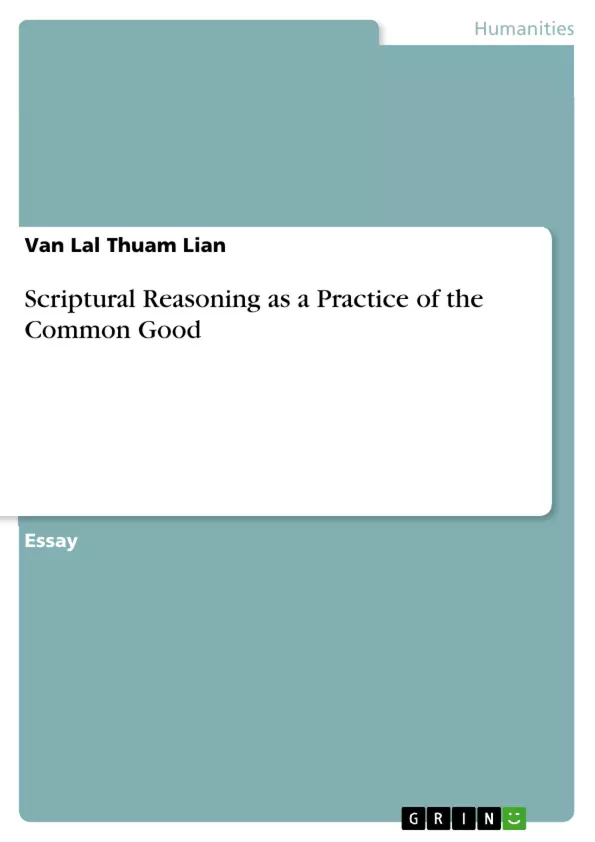This essay is a critical evaluation of Scriptural Reasoning, “a wisdom-seeking engagement with Jewish, Christian and Muslim scriptures,” and its role in seeking the common good today. It has two parts. The first part deals with the significance of Scriptural Reasoning as a practice of the common good in the world today, and the second part highlights the limitations of Scriptural Reasoning in its application to different contexts. In a nutshell, this essay argues that Scriptural Reasoning is a hopeful and promising practice of the common good for the twenty-first century society.
Inhaltsverzeichnis (Table of Contents)
- Introduction
- Scriptural Reasoning as a Practice of Common Good
- Shared Place
- Religious Way of Reconciliation
- Openness to Future
- Healing of Social Relationship
- Limitations of Scriptural Reasoning
- Conclusion
Zielsetzung und Themenschwerpunkte (Objectives and Key Themes)
This essay examines the practice of Scriptural Reasoning, exploring its potential to foster the common good in contemporary society. It argues that Scriptural Reasoning offers a promising path towards greater understanding and cooperation between different faiths. The essay first explores the significance of Scriptural Reasoning as a practice of the common good, highlighting its emphasis on shared spaces, reconciliation, and openness to the future. It then moves on to discuss the limitations of this practice in its application to various contexts.
- The importance of Scriptural Reasoning as a practice of the common good
- The potential of Scriptural Reasoning to promote interfaith dialogue and understanding
- The role of shared spaces and mutual respect in fostering the common good
- The challenges and limitations of Scriptural Reasoning in various contexts
- The future of Scriptural Reasoning and its contribution to a more just and peaceful society.
Zusammenfassung der Kapitel (Chapter Summaries)
The essay begins by defining Scriptural Reasoning as a practice of interfaith reading, where participants from different faiths engage in discussions and interpretations of scripture. It argues that Scriptural Reasoning, with its focus on shared spaces, mutual understanding, and the search for common ground, represents a powerful tool for promoting the common good in the 21st century. The essay then explores the significance of shared places in Scriptural Reasoning, suggesting that the act of sharing a space together fosters a sense of community and respect, essential for building bridges between different faiths. It further emphasizes the role of religion in seeking the common good, arguing that religion can play a vital role in promoting peace and reconciliation in a religiously pluralistic world. The essay then delves into the importance of openness to the future in Scriptural Reasoning, highlighting its potential to heal past wounds and build a more just and peaceful society. Finally, it addresses the potential for healing social relationships through Scriptural Reasoning, emphasizing its ability to foster understanding and empathy between people of different faiths.
Schlüsselwörter (Keywords)
The primary themes and concepts explored in this essay revolve around Scriptural Reasoning, interfaith dialogue, the common good, shared spaces, reconciliation, religious pluralism, and the future of interfaith relations. The essay analyzes the practice of Scriptural Reasoning as a tool for promoting understanding and cooperation between different faiths, focusing on its potential to contribute to a more just and peaceful society.
Frequently Asked Questions
What is Scriptural Reasoning (SR)?
Scriptural Reasoning is a practice where Jews, Christians, and Muslims meet to read and discuss their respective sacred scriptures together, seeking wisdom and mutual understanding.
How does Scriptural Reasoning contribute to the common good?
It fosters reconciliation, heals social relationships, and creates shared spaces where people of different faiths can engage in peaceful dialogue and cooperation.
Why is the concept of a "shared place" important in SR?
Sharing a physical or intellectual space builds a sense of community and mutual respect, which are essential foundations for interfaith peace in pluralistic societies.
What are the limitations of Scriptural Reasoning?
The practice may face challenges when applied to different cultural or political contexts where power imbalances or historical traumas make open dialogue difficult.
Does Scriptural Reasoning aim to merge different religions?
No, it is not about finding a single universal religion, but about respecting differences while seeking common ground for the benefit of society.
Is Scriptural Reasoning relevant for the 21st century?
Yes, the essay argues it is a hopeful and promising practice for addressing religious pluralism and social fragmentation in modern society.
- Quote paper
- Van Lal Thuam Lian (Author), 2016, Scriptural Reasoning as a Practice of the Common Good, Munich, GRIN Verlag, https://www.grin.com/document/337532



